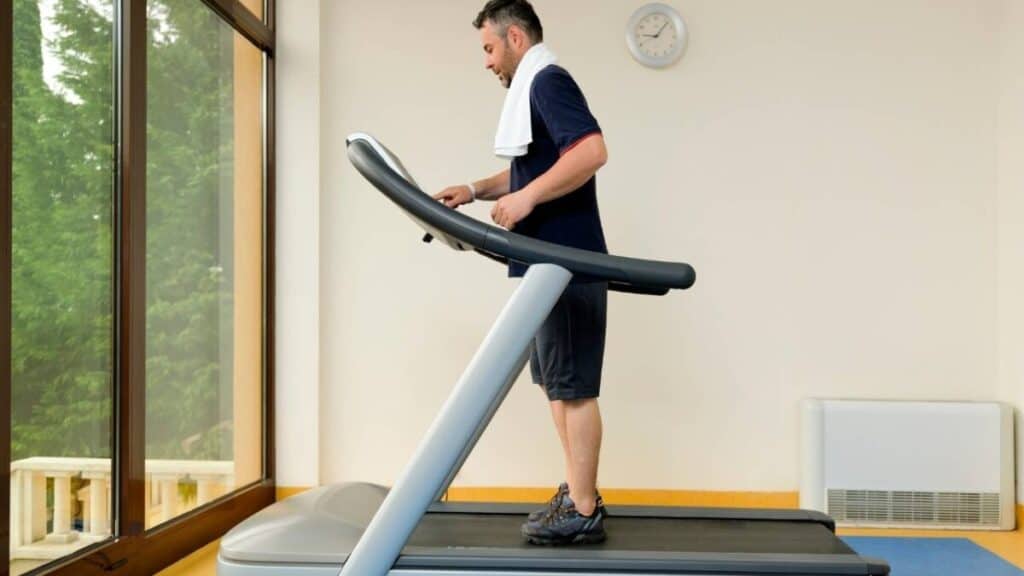Like to know how many calories do you burn running 1 km for your weight? Is it worth the time and effort to run 1 km and will it be enough calories for you to lose weight and burn fat?
In this article I give you a full explanation of how many calories you can burn running 1 km and I’ve broken it down into a helpful table so you can compare the number of calories for difference weight groups.
Table of Contents
How Many Calories Do You Burn Running 1km

On average, you burn between 70 and 120 calories running 1km non-stop. Nevertheless, this number will be higher or lower depending on your weight, speed, and terrain. If you weigh more, you will burn extra calories because it takes more energy to move your body. If you run on a hilly terrain, you will also burn additional calories because it is more challenging to run uphill.
The table below show you how many calories do you burn running 1 km for your exact weight. This is an estimate based on the average running speed for 1km. To discover the average 1 km run time for your age and gender, read this post.
Calories Burned Running 1 km Slow Speed 7 min/km
| Calories Burned Running 1 km Slow Pace 8kph | |||
| Body Weight | |||
| Pounds (lbs) | Kilograms (kg) | Calories Burned | |
| 140 lbs | 63 kg | 66 | |
| 150 lbs | 68 kg | 70 | |
| 160 lbs | 72 kg | 74 | |
| 170 lbs | 77 kg | 78 | |
| 180 lbs | 81 kg | 82 | |
| 190 lbs | 86 kg | 86 | |
| 200 lbs | 81 kg | 90 | |
| 210 lbs | 95 kg | 95 | |
| 220 lbs | 99 kg | 99 | |
| 230 lbs | 104 kg | 104 | |
| 240 lbs | 108 kg | 108 | |
| 250 lbs | 113 kg | 113 | |
| 260 lbs | 117 kg | 117 | |
💡Struggling with stubborn weight that won’t budge? Tired of yo-yo diets and empty promises? Say goodbye to past failures and hello to guaranteed success with our fail-proof, personalised calorie plans! Uncover scientifically-backed strategies that make weight loss effortless, helping you shed up to 24 pounds in just 12 weeks. This isn’t a fad; it’s a lifestyle transformation. Don’t miss out—your journey to a slimmer, more confident you is just one click away!
Calories Burned Running 1 km Moderate Speed 6 min/km
| Calories Burned Running 1 km Moderate Pace 9.6kph | |||
| Body Weight | |||
| Pounds (lbs) | Kilograms (kg) | Calories Burned | |
| 140 lbs | 63 kg | 70 | |
| 150 lbs | 68 kg | 74 | |
| 160 lbs | 72 kg | 79 | |
| 170 lbs | 77 kg | 83 | |
| 180 lbs | 81 kg | 87 | |
| 190 lbs | 86 kg | 92 | |
| 200 lbs | 81 kg | 96 | |
| 210 lbs | 95 kg | 101 | |
| 220 lbs | 99 kg | 106 | |
| 230 lbs | 104 kg | 111 | |
| 240 lbs | 108 kg | 116 | |
| 250 lbs | 113 kg | 120 | |
| 260 lbs | 117 kg | 125 | |
Calories Burned Running 1 km Fast Speed 5 min/km
| Calories Burned Running 1 km Fast Pace 12kph | |||
| Body Weight | |||
| Pounds (lbs) | Kilograms (kg) | Calories Burned | |
| 140 lbs | 63 kg | 68 | |
| 150 lbs | 68 kg | 73 | |
| 160 lbs | 72 kg | 77 | |
| 170 lbs | 77 kg | 81 | |
| 180 lbs | 81 kg | 85 | |
| 190 lbs | 86 kg | 89 | |
| 200 lbs | 81 kg | 94 | |
| 210 lbs | 95 kg | 99 | |
| 220 lbs | 99 kg | 103 | |
| 230 lbs | 104 kg | 108 | |
| 240 lbs | 108 kg | 113 | |
| 250 lbs | 113 kg | 118 | |
| 260 lbs | 117 kg | 122 | |
Calories Burned Running 1 km Very Fast Speed 4 min/km
| Calories Burned Running 1 km Very Fast Pace 16kph | |||
| Body Weight | |||
| Pounds (lbs) | Kilograms (kg) | Calories Burned | |
| 140 lbs | 63 kg | 63 | |
| 150 lbs | 68 kg | 68 | |
| 160 lbs | 72 kg | 72 | |
| 170 lbs | 77 kg | 77 | |
| 180 lbs | 81 kg | 81 | |
| 190 lbs | 86 kg | 86 | |
| 200 lbs | 81 kg | 90 | |
| 210 lbs | 95 kg | 95 | |
| 220 lbs | 99 kg | 99 | |
| 230 lbs | 104 kg | 104 | |
| 240 lbs | 108 kg | 108 | |
| 250 lbs | 113 kg | 113 | |
| 260 lbs | 117 kg | 117 | |
Examples of how many calories you can burn running 1km:
- A person who weighs 150 pounds (68 kg) and runs at a pace of 8 minutes per km will burn about 80 calories.
- A person who weighs 200 pounds (91 kg) and runs at a pace of 6 minutes per km will burn approximately 100 calories.
- A person who weighs 250 pounds (113 kg) and runs at a pace of 4 minutes per km will burn roughly 120 calories.
Other Running Distance You Might Find Helpful

Can You Lose Weight Running 1 km Every Day
Running 1 km every day is a great way to get physical activity and burn calories. However, it may not be enough to help you lose weight if your calorie intake is still high. To lose weight, you need to create a caloric deficit of 3500 each week by burning more calories than you consume daily.
This means that you have to combine regular physical activity with a healthy and balanced diet. Running 1 km can help you burn calories and lose weight if you are consistent in your efforts and combine it with a healthy diet.
You should also vary your speeds and terrain to create an effective workout plan that meets your needs. So whether you’re a beginner or an experienced runner, make sure to be safe and have fun.

Should You Run 1km Every Day
If you are a beginner, you should only run 3-4 times per week and gradually increase your mileage. If you run too often, you risk injury and burnout. Additionally, if you are only running 1km, you are not giving your body enough time to recover between runs. Therefore, it’s not recommended to run 1km every day.
However, if you’re looking to run further than 1km and have a running programme, it will advise running 5-6 times a week. These programmes begin slow and advance to running multiple times a week. It’s essential to listen to your body and rest if you feel sore or have tight muscles.
But your body will quickly adapt to regular running after 4 weeks. I personally like to run 3-4 times a week, twice on the treadmill and twice outdoors. I use the Peloton or elliptical to give my legs a rest from running and to use other muscle groups.
I use running to maintain my body weight and increase my general fitness, not for competition or long-distance running. Therefore, decide what your goals are and adjust appropriately.

Do You Burn More Calories Running Outdoors or on a Treadmill
The amount of calories burned running outdoors or on a treadmill depends on several factors, including your weight and fitness level. Generally, running outdoors will burn more calories than a treadmill due to changes in terrain and the elements.
Outdoor runs are also more likely to include hills, which require more energy and therefore burn more calories. Additionally, depending on the temperature, running outside may require cooling systems to work harder, resulting in more calories burned.
However, when it comes to running on a treadmill you have greater control of the speed and incline settings, which can help you burn more calories than an outdoor run. This is why some people prefer using a treadmill over an outdoor run, as they can tailor the settings to their individual needs and goals.
Overall, it is important to remember that each person’s calorie burn varies depending on various factors such as weight, fitness level and age. It is best to experiment with different methods of running in order to find out which one works best for you and helps you reach your fitness goals.
How Many Calories Do You Burn Running 1 km Summary
Hopefully I’ve answered your question on how many calories you burn running 1 km and its around 100 calories. This depends on your current body weight, the speed that you run the 1km and your fitness levels. The best way to track 1 km average calories burned is to buy a fitness tracker.



